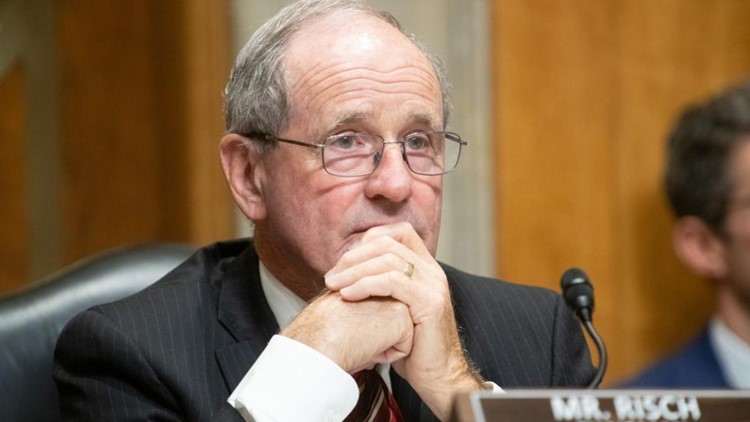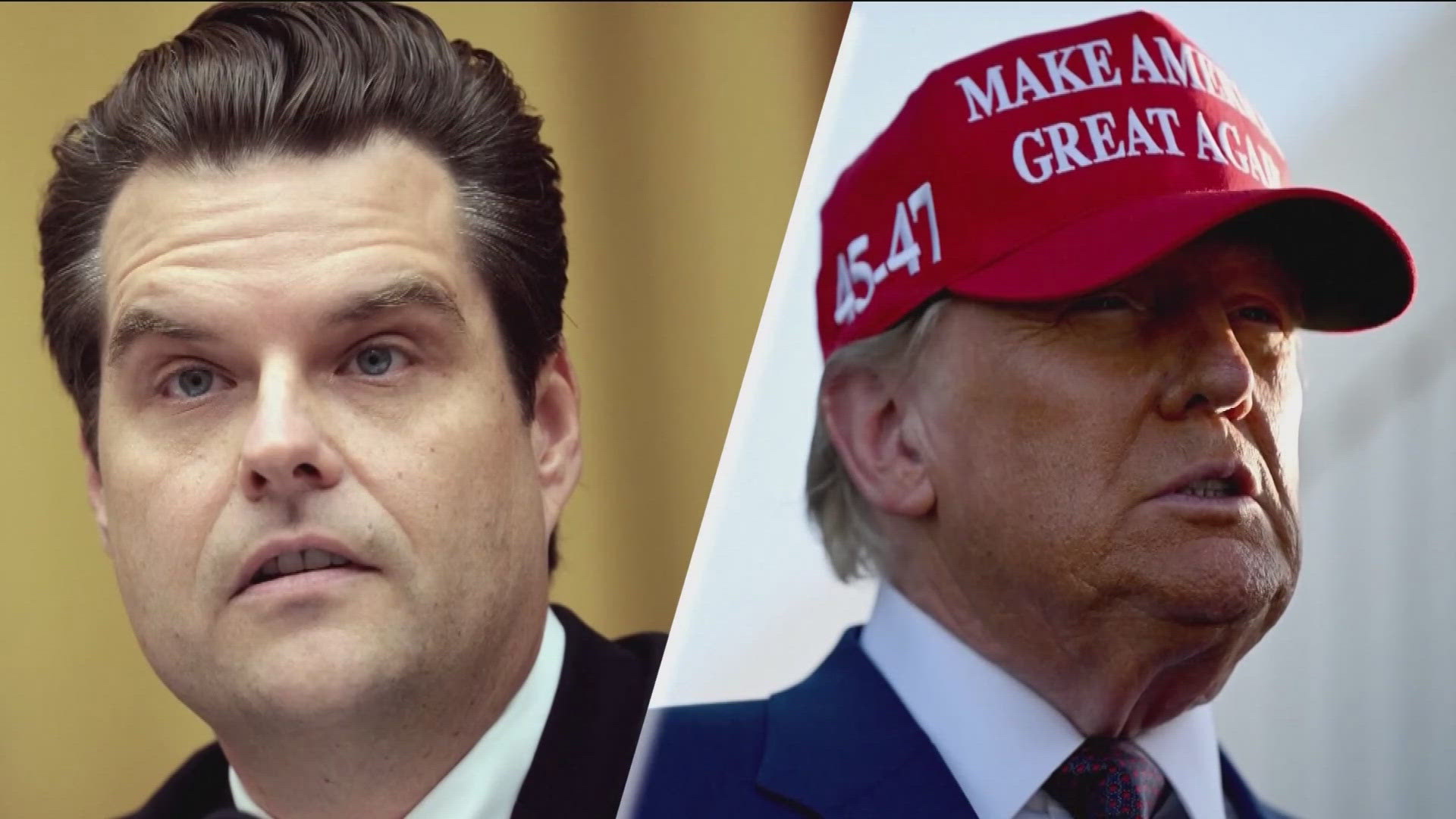WASHINGTON, D.C., USA — Jim Risch had just asked Pat Kole of the Idaho Potato Commission about this year’s potato crop when his cellphone rang loudly, its bright, old-fashioned “brring, brring” ringtone startling everyone in the conference room of Risch’s Senate office, according to a report from the Idaho Press.
“Guys, this is the White House — I gotta take this,” Risch said, ducking out of the meeting.
In his 10 years in the nation’s capital, Risch has gone from a little-remarked senator from a small state to chairman of the Senate Foreign Relations Committee, one of the most powerful and high-profile positions in Congress. Heads of state and other high-ranking foreign officials regularly seek him out; the president and top administration officials are in touch frequently.
In today’s Washington, D.C., it’s a role that preceded early retirement after two terms for Risch’s predecessor, GOP Sen. Bob Corker of Tennessee, who held the gavel for four years. Corker had repeated, testy, high-profile clashes with GOP President Donald Trump, whose often unorthodox and fast-changing positions on foreign policy have included overtures to the nation’s biggest enemies and insults to longtime allies. It’s a role that Risch relishes.
“The president interacts with me on a very respectful basis. That respect flows both directions,” Risch said, “and that’s how you get things done.”
‘BY TELEPHONE, NOT MICROPHONE’
Risch has raised hackles among Democrats, pundits and the press for declaring that he’ll keep his differences with Trump private, but many of his Senate Republican colleagues on the Foreign Relations Committee laud him for that approach.
“Jim believes the way to talk with the president is by telephone, not microphone,” said Sen. John Barrasso, R-Wyoming.
Sen. Todd Young, R-Indiana, praised Risch’s “quiet and focused leadership, as opposed to a lot of bloviating.”
“He’s a grownup,” said Sen. Marco Rubio, R-Florida, a close ally of Risch. “I think he has seen enough in his life, both as a person and as a public official, to know what matters and what doesn’t. … I’ve learned a lot from him in this regard.”
Risch's approach also has drawn criticism, however. Michael O’Hanlon, a senior fellow with the Brookings Institution and its director of research on foreign policy, calls it “regrettable.”
“A senator should never be afraid to challenge a president, because the reason we’ve been a successful democracy is because we have three branches of government,” O’Hanlon said. “The three branches are checks and balances on each other. If you just disagree with him in private, it may not create any political pressure.”
Plus, he said, public disagreement allows the citizenry at large to be involved in the debate.
Others see Risch's quiet approach as the more productive path.
“Sen. Corker did not really advance the ball at the committee by virtue of his public spats with President Trump," said Jon Lerner, a senior fellow at the Hudson Institute and former deputy to the U.S. ambassador at the United Nations; he was part of the Trump Administration until the end of 2018.
“President Trump actually speaks to members of Congress far more often than previous presidents did, certainly than President Obama or President Bush,” Lerner said. “That’s sort of how he approaches dealings with Congress.”
RELATED: 'I'm surprised it took this long': Idaho Sen. Jim Risch weighs in on Trump impeachment inquiry
Lerner said when he was with the administration, Risch was “viewed very positively.”
“The view of Sen. Risch is that he’s a serious guy, he’s not a show horse, he’s not somebody who tries to get publicity for himself. He’s very serious about U.S. foreign policy," he said. "And his policy views, not in every case, but in most cases, align with where the administration is. So he was very much seen as an ally.”
Sen. Mitt Romney, R-Utah, said, “If he feels the administration is making an error, he is assertive in pushing back. … I watched him in an interaction with the president, and the president didn’t like the points of view that Republican senators were expressing. Sen. Risch was relentless and determined, and he succeeded in redirecting an important policy decision.”
“His approach has been effective to date,” Romney said. “The issues he’s had, he has been able to impact policy. I have seen that firsthand.”
Risch said bluntly, “It’s the only approach that will work.”
“If you’re results-oriented, you have to figure out what works, and then use that,” he said.
HOW HE GOT HERE
After a long career in the Idaho Senate, two terms as lieutenant governor and a seven-month stint as governor, Risch, a self-made millionaire lawyer from Boise, arrived in Washington, D.C., in 2009 ready for a change.
“I said I didn’t want anything to do with money,” Risch said in a recent speech in Boise. “After all the years I spent in state government, I’m tired of dealing with taxes and budgets and appropriations. I even turned down a seat on the appropriations committee. And I wound up with what I think is a dream portfolio, because … it is absolutely, incredibly interesting.”
Risch’s fellow Idaho senator, Republican Mike Crapo, who long has chaired the Senate’s “Committee on Committees” that parcels out committee assignments, said, “We had seats available on appropriations at that point, but Jim wanted Foreign Relations.”
Appropriations is the powerful committee that decides how federal tax money is spent — what gets funded and what doesn’t. It’s where 2nd District Idaho Rep. Mike Simpson has built his power in his 21-year career in the House.
“There’s a lot of things you can do for your district and for your state,” Simpson said.
Simpson, a dentist and former speaker of the Idaho House, said he’s glad Risch passed on an appropriations seat.
“I think it’s a mistake for all four of us to try and get on the same committees,” he said. “With only four (Idaho) members, it’s important for us to try and spread out.”
Simpson said when he runs into a banking issue, he calls Crapo, who chairs the Senate Banking Committee. He does the same with Risch on matters in Risch's wheelhouse.
“If something comes up regarding foreign affairs or intelligence, we’ll call Jim’s office, and Jim will tell us what he can,” he said with a chuckle, noting that Risch deals with lots of classified information that he can’t discuss. That citing of what he knows but can’t talk about is among Risch’s hallmarks in Washington, D.C.
“Jim has a good relationship with the president,” Simpson said. “He doesn’t criticize him, and I think that’s kind of how you have to handle it. Most Republicans don’t like the behavior … but they like (Trump's) policies, and ultimately it comes down to policies.”
“I think Jim consults with the president probably more than we think about these issues,” Simpson said. “As far as I can tell, I think Jim’s doing a really good job over there, I do.”
Before heading to D.C., Risch had little international background beyond overseas vacations with his wife, Vicki. His undergraduate degree from the University of Idaho was in forestry.
“Jim decided he wanted to do foreign relations,” Crapo said. “He is an incredibly intelligent, fast learner. … He’s like a sponge. He learned at deep levels, even down to the personal relationship level with leaders of foreign countries.”
Crapo said when he arrived in Washington, D.C., he decided to focus on finance, “the revenue side of government,” which included entitlements, international trade, banking, the housing market and urban development, the stock market, the federal reserve, and the economy.
“I had to make the same choice in reverse,” Crapo said. “Although I made it differently, I made it with some reluctance.”
Crapo, before he earned his law degree at Harvard, majored in international relations and political science at Brigham Young University.
'PARTISAN AND DIVIDED' ERA
Risch has been known throughout his career as a conservative Republican, a highly partisan figure. He notes that just two years after he arrived at the Idaho Senate as a freshman, he was in GOP leadership, and he stayed in leadership from there on out, rising to Senate president pro-tem.
“You get much more of a reputation as a partisan when you’re in leadership — you have to carry the flag,” he said.
But the Senate Foreign Relations Committee has historically been a bastion of bipartisanship, based on the longstanding principle, as articulated by then-Sen. Arthur Vandenberg, R-Michigan, in 1945, that politics stop at the water’s edge, when the nation deals with other nations.
“I try to avoid partisanship,” Risch said. “Having said that, Republicans and Democrats are different — they’re more different today than at any time in 50 years, and they’re drifting further. They have a different view of government.”
Sen. Christopher Coons, D-Delaware, said, “I think he is chairman in one of the most divided and partisan periods in American history. Some of my colleagues would say he is a more partisan chairman. This is also a more partisan and divided period.”
Risch gets high marks from minority Democrats on the committee for his responsiveness and inclusiveness as chairman.
“There are very few senators with whom I vote the opposite way more frequently than Jim Risch, but he is responsive and listens, and I appreciate it,” Coons said.
Democratic Sen. Tim Kaine, R-Virginia, Hillary Clinton’s 2019 vice presidential pick, said, “Look, I’m not a big fan of the president, bluntly, and Jim is a big fan of the president. So we have major differences.” But he said Risch’s approach to the chairmanship has benefited him as a minority member of the Senate Foreign Relations Committee.
“I would frankly be in the dark about a lot of things, if it hadn’t been for Jim,” Kaine said.
When Kaine couldn’t get the Trump administration’s state department to turn over documents about nuclear technology transfers to Saudi Arabia, he asked about it during an open committee hearing, and Risch backed him up.
“He said, ‘You’re entitled to that information,’ and I had it within 48 hours,” Kaine said.
Young, the Republican senator from Indiana, lauded Risch’s directness.
“I’ve found his leadership refreshing,” he said. “He’s brought a level of candor and directness to committee leadership. It’s very easy to get an unvarnished and clear assessment from Sen. Risch with regard to challenges I might encounter in trying to advance some legislation.”
Though Risch didn't originally support Trump for president — he backed Rubio — he has emerged as one of Trump's biggest defenders in Congress, frequently dismissing all criticism of Trump, including the impeachment inquiry, as "hate and vitriol" that is "so over the top."
Kaine doesn't buy Risch's talk of quietly and privately disagreeing with Trump.
"That does assume disagreement. … I don’t know what that would be,” Kaine said. "I think Sen. Risch sincerely believes that they’re … following the right path."
Heather Conley, senior vice president at the respected think tank Center for Strategic and International Studies, and a former deputy assistant secretary of state under President George W. Bush, said, “I would characterize Sen. Risch as a traditional Republican hawk, who’s trying to manage within a very disruptive foreign and security policy environment and trying to, the best he can, maintain a bipartisan approach in a very partisan environment for foreign policy and national security issues.”
“I think this would be difficult for any senator to manage this,” Conley said. “It’s not just obviously a disruptive environment. You have deep partisanship that has seeped fully into foreign policy and national security. You really have a Congress that is struggling to function as a balancing force, a check on the executive.”
Conley said there “have always been important tactical differences between Republicans and Democrats on foreign policy. But we had a larger bipartisan consensus on how we should approach major challenges to the United States.”
That began to erode in the early 2000s, she said, with the Iraq war, when “questioning the policy was questioning patriotism. It’s a vote that still 17 years later, it’s still a litmus test for politicians, on how they voted. That was really what began this deep partisanship.”
Things like the Iran nuclear agreement are seen in such partisan terms that, for example, Risch himself refers to it as a policy of the Obama Administration, rather than the U.S. government.
“When we see partisanship on major agreements, then they are undone when a new administration comes in,” Conley said. “So that partisanship damages the U.S. and its credibility and its certainty as a foreign policy actor, and in some ways it makes us more insecure.”
“I give Sen. Risch great credit for trying to restore bipartisanship on the Foreign Relations Committee,” Conley said, though he’s suffered “some bumps and bruises,” most notably on his Saudi Arabia legislation. “But at least he’s trying.”
SAUDI ARABIA, HONG KONG
Though Risch rarely makes national headlines, he did so in late July, when the Foreign Relations Committee rejected his proposed Saudi Arabia sanctions bill in favor of a stronger one proposed by ranking Democratic Sen. Bob Menendez, D-New Jersey, blocking arms sales and in-flight refueling of Saudi aircraft in retaliation for the murder of Washington Post columnist Jamal Khashoggi. That prompted Risch to withdraw his own bill, and nothing ended up moving forward.
“Foreign Relations Committee snubs Republican chairman on Saudi Arabia,” declared the headline on Politico, over a photo of a perturbed Risch. “Senators break ranks over Saudi Arabia,” said the headline in Foreign Policy Magazine.
There was much concern that, in the hubbub, Risch was violating “comity,” a longstanding tradition on the committee that the chairman and ranking minority member negotiate the agenda. Risch says it didn’t happen.
“Comity means different things to different people,” he said. “I’ve bent over backwards to make the thing work and to get along. But Sen. Menendez and I have a different view of what comity is.”
He said Menendez suggested nothing should go on the committee’s agenda without the two of them agreeing on it.
“I said, ‘So you’re the chairman?’” he recalled.
Risch had negotiated his milder bill with the president, and said Trump had committed to signing it — even though the president at the time wasn’t enthusiastic about taking steps against Saudi Arabia.
“The bill that survived cannot become law, as it would be vetoed,” Risch said in a statement after the committee’s vote. “But, it was a fair debate, a fair vote, and now it’s done. The committee will move on to other pressing business.”
On Hong Kong, by contrast, Risch has moved forward in a bipartisan fashion, joining Menendez to meet with the leaders of the nation’s pro-democracy movement in September and advancing bipartisan legislation co-sponsored by the committee’s two second-ranking members of each party, Rubio and Sen. Ben Cardin, D-Maryland.
When Risch and Menendez met with the young protest leaders in the Foreign Relations Committee’s ornate, historic hearing room in the Capitol on Sept. 19, and Hong Kong activist Joshua Wong recounted brutal tactics used by police against the democracy protesters, Risch declared, “The world is watching.”

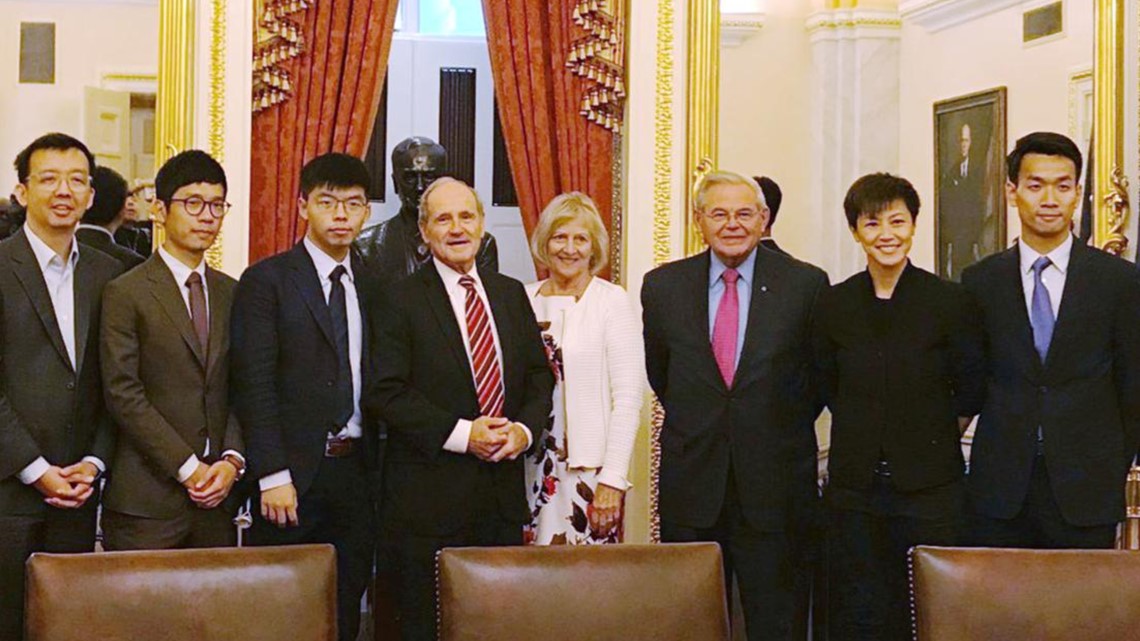
A week later, the Senate committee unanimously passed the “Hong Kong Human Rights and Democracy Act,” and Risch said, “After more than two decades of broken promises, it is time that we hold the Chinese Communist Party accountable for its erosion of Hong Kong’s autonomy. This bill takes important steps in that direction. I am proud of the bipartisan work that went into this legislation — we are all proud to stand with the people of Hong Kong in pursuit of their fundamental freedoms.”
Conley said that’s the “perfect example” of how Congress can still work to influence foreign policy in the current disruptive environment. “When Congress speaks in a bipartisan way and sends a clear message that the value and the dignity of the individual, standing for democracy and liberty (matters) … it is a balance to the president,” she said. “And hopefully it will start to change the president’s language and action.”
“It may not grab all the headlines in the world, you may not be able to see that change,” she said, “but the message that that sends to the Hong Kong activists is critical. … We underestimate the power of that moral perspective, and giving hope to people that are fighting oppression. And Congress is really important. I really commend him for doing it and making it bipartisan."
DAYS OF DYSFUNCTION
Rubio faults Democrats for the dysfunction on Capitol Hill, where budgets don’t get passed, deadlines are missed, government shutdowns are regularly threatened and there’s a near-constant air of chaos. It’s a common theme; each party regularly blames the other.
On a recent morning in the Senate, the opening remarks from the majority and minority leaders featured each accusing the other of obstruction and dishonesty. Senate Majority Leader Mitch McConnell, his left arm in a sling, ripped into Senate Democrats for what he described as putting up “a familiar litany of partisan stumbling blocks” before the appropriations process.
Then, Minority Leader Sen. Chuck Schumer shot back, saying, “I’ve heard some howlers in my day, but that’s pretty rich, what Leader McConnell is saying.”
Republicans control the Senate, Democrats control the House. The House currently is immersed in an impeachment inquiry against Trump — an issue so politically volatile that it’s figuratively sucking all the air out of the Capitol, leaving little for other pressing issues.
After the Senate's failed attempt to pass a “mini-bus” — versus “omnibus” — budget bill amid party squabbling over border-wall funding, Risch said, “This is not the way it should be done, there’s obviously no question about it.” But, he said, “The president has absolutely run into a brick wall. It’s so partisan that ‘the wall’ has become a euphemism for everything the president stands for.”
“Now, you can’t even talk about it,” Risch said in disgust.
Risch, Rubio said, is “operating under a very different set of circumstances, so his years of experience at every level of government has really served him well.”
Those different circumstances?
“We’re running up against an unparalleled level of obstruction,” Rubio said, “to where Democrats are objecting to even nominees that in years past would have flown through.”
Conley said multiple factors have played into the huge list of vacancies among key State Department and foreign service positions in the Trump Administration, and Risch has been trying to move some of those along.
“The White House has been … slow in nominating, slow in putting forward the paperwork, slow, slow, slow even three years into the process,” she said. “And sometimes those nominees are going to be individuals that will need greater scrutiny because they do not have experience in the portfolios they are about to enter. The Democrats, some could argue with extreme due diligence, are doing their part to be extremely thorough in the vetting process, probably more thorough than previous parties would have done. Which has a cumulative effect of slowing this process down.”
Even Lerner, who worked in the Trump Administration, agreed. “That’s the fault of the White House,” he said.
Coons noted that Trump himself had no previous experience in government when he took office. “He is learning foreign policy on the job,” Coons said. “We don’t have an ambassador to Pakistan or Jordan today. … No one’s ever been nominated.”
He noted, “Some of these issues are not of Sen. Risch’s making at all.”
FRENETIC PACE
Risch’s days in the Senate proceed at a lightning-quick pace. He sits for a briefing on Asia issues with his staff in his office before a big hearing in the Foreign Relations Committee, asks a few questions, makes some notes in a binder with a Sharpie.
“Thanks — good job,” he concludes. “This is good stuff.”
Immediately after that briefing, a staffer informs him the president has tweeted about a new national security adviser appointee.
“It was the worst-kept secret in D.C.,” Risch responds, adding, “Good pick. He’s got a solid reputation.”
He then heads off to the hearing, and is accosted in the Capitol basement by a phalanx of national reporters with questions about the attack on Saudi Arabian oil infrastructure.
“I’ve reviewed all the intelligence on the matter,” Risch declares. “The president was on very firm ground.”
Asked by reporters what more he needs to hear to conclude that Iran was responsible for the attack, Risch says brusquely, “I don’t need to hear anything more. It speaks for itself.”

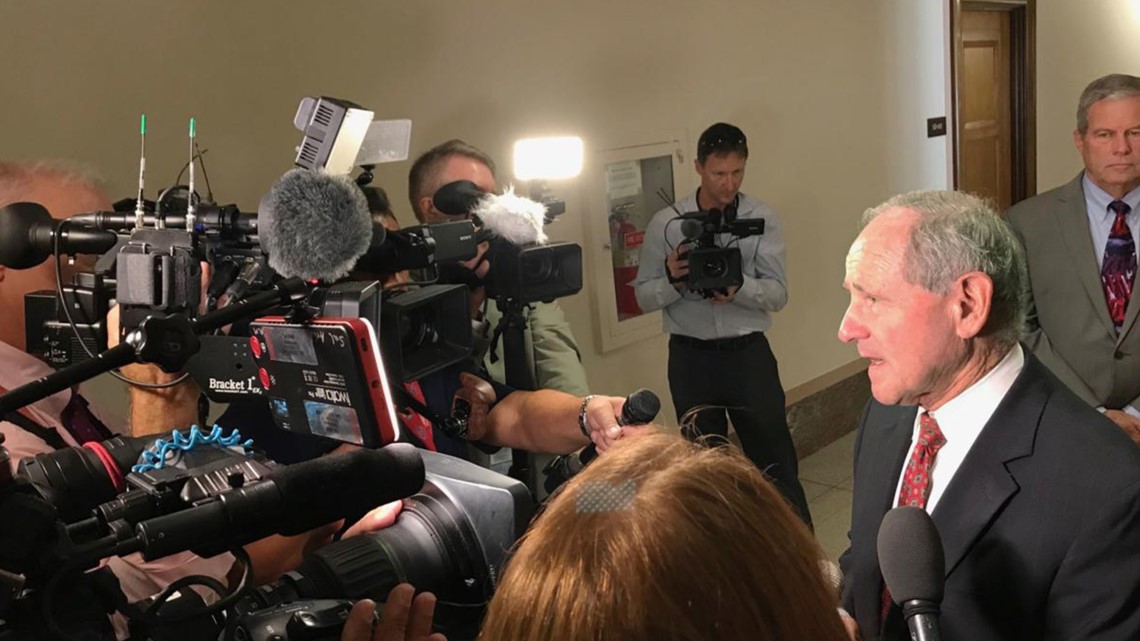
The reporters move on, and Risch steps onto the Capitol’s internal subway to travel to the hearing.
Asked how frequently he gets questions about his conversations with the president, Risch says, “Oh, 10 times a day. Frequently.” He shares little from those conversations, beyond general positions with which he’s stating agreement.
While presiding over the Asia hearing, he has to leave periodically to cast votes on the Senate floor, as do other members of the panel; Risch hands the gavel off to another member when he steps out.
Risch’s schedule before and after the hearing is peppered with various meetings with constituent groups, each of them cued up in a different conference room surrounding his Senate office. He meets with health care advocates from Idaho. He steps behind closed doors to chat with Micron Technology CEO Sanjay Mehrotra. He meets with representatives of Melaleuca and Scentsy pushing a direct-selling bill.
“You’re not going to have any trouble with me on this,” he tells them. “I know what a contract employee is.”

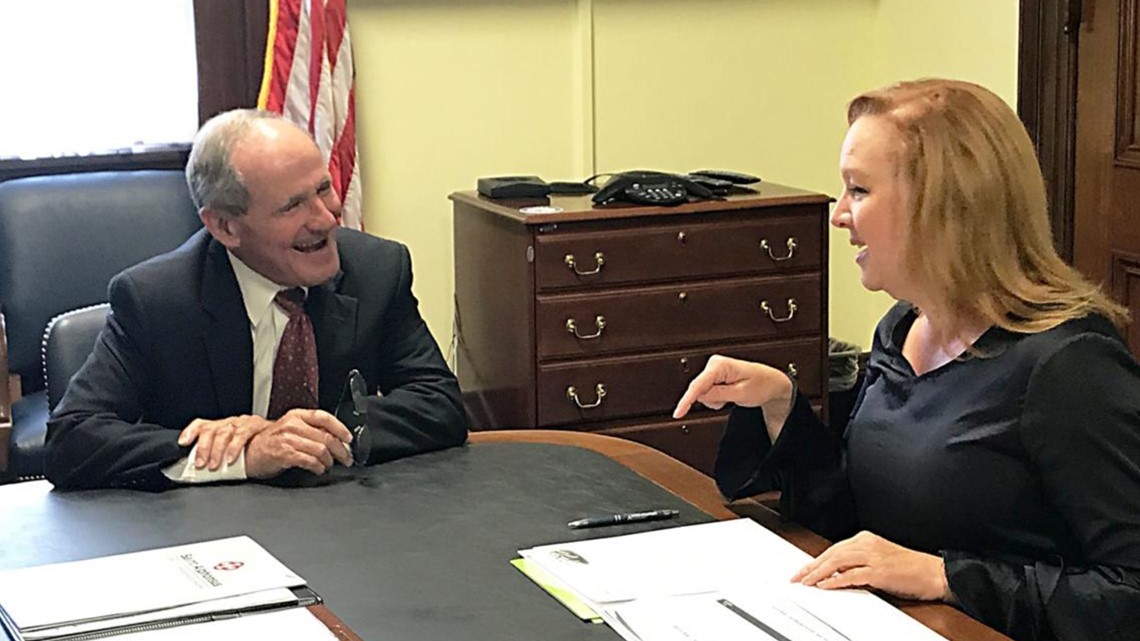
Risch says he once held 26 constituent meetings in a single day. Now that he’s the Foreign Relations chairman, his schedule also includes visits with international delegations and high-ranking foreign officials.
Conley said the nation’s biggest foreign policy challenges right now are in some ways beyond the reach of a weakened congressional branch.
“Congress does not implement or execute foreign security policy,” she said. “They hold power of the purse strings, which is important. They hold laws on sanctions. They can prohibit, but they cannot implement. So when Congress has weighed in on Russia sanctions, Chinese policy and technology transfers … there’s bipartisan unity on that. But Congress does not execute the policy.”
“The unevenness, the absolute uncertainty on any given day what our policy is … will it be leveraged, will it be used,” she said. “This is where Congress has no control. That is in some ways the most maddening part of it. For a policy to be effective … there has to be certainty and credibility. We have neither right now.”
Risch says, “My job is to do the best I can for America and for my state.” That doesn’t include fighting with the president, he said. “The president and I have disagreements, but I have found the best way to try and have some influence is to keep it between he and I.”
More from our partner Idaho Press: Eye on Boise: A presumption of openness


